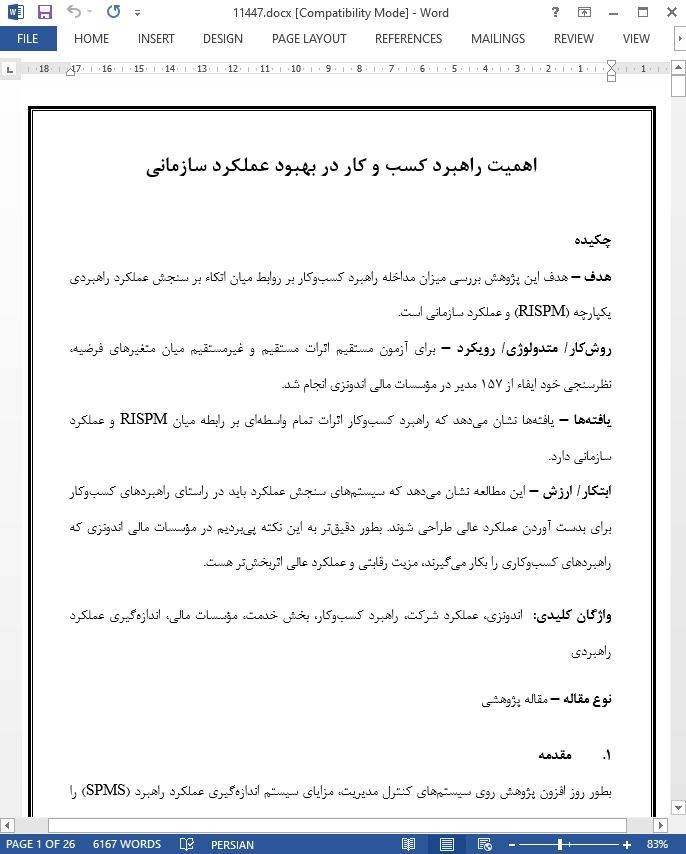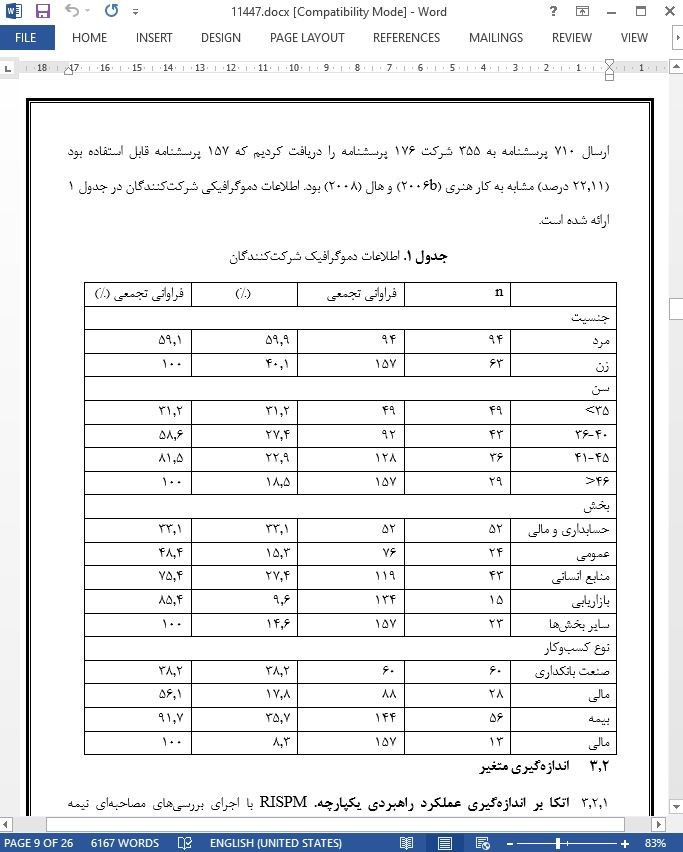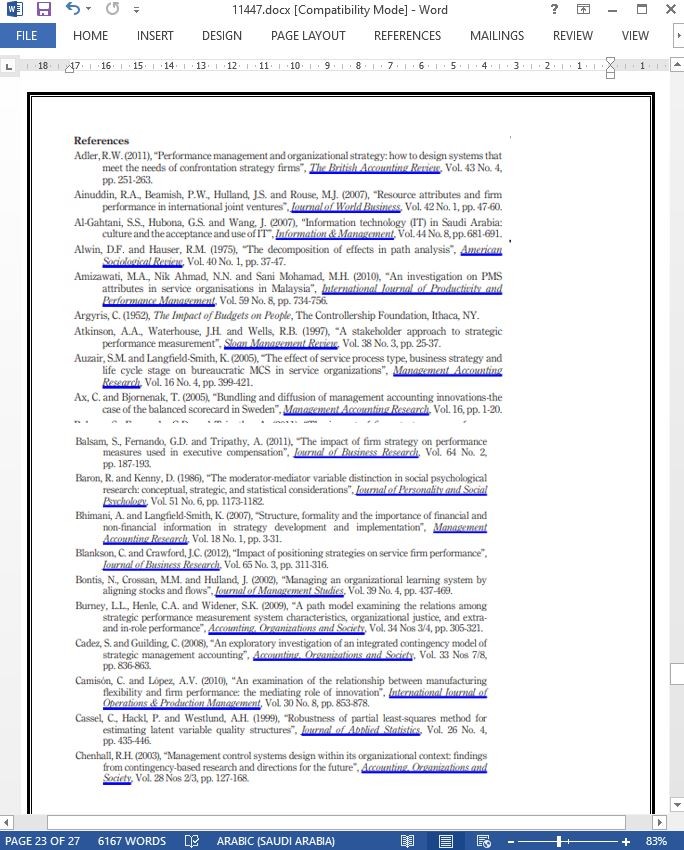
اهمیت راهبرد کسب و کار در بهبود عملکرد سازمانی
چکیده
هدف – هدف این پژوهش بررسی میزان مداخله راهبرد کسبوکار بر روابط میان اتکاء بر سنجش عملکرد راهبردی یکپارچه (RISPM) و عملکرد سازمانی است.
روشکار/ متدولوژی/ رویکرد – برای آزمون مستقیم اثرات مستقیم و غیرمستقیم میان متغیرهای فرضیه، نظرسنجی خود ایفاء از 157 مدیر در مؤسسات مالی اندونزی انجام شد.
یافتهها – یافتهها نشان میدهد که راهبرد کسبوکار اثرات تمام واسطهای بر رابطه میان RISPM و عملکرد سازمانی دارد.
ابتکار/ ارزش – این مطالعه نشان میدهد که سیستمهای سنجش عملکرد باید در راستای راهبردهای کسبوکار برای بدست آوردن عملکرد عالی طراحی شوند. بطور دقیقتر به این نکته پیبردیم در مؤسسات مالی اندونزی که راهبردهای کسبوکاری را بکار میگیرند، مزیت رقابتی و عملکرد عالی اثربخشتر هست.
1. مقدمه
بطور روز افزون پژوهش روی سیستمهای کنترل مدیریت، مزایای سیستم اندازهگیری عملکرد راهبرد (SPMS) را تنها در سیستم اندازهگیری حسابداری نشان داده است (ایتنر وهمکاران، 2003). با این وجود، تحقیقات روی ارزشمندی SPMS علیالخصوص کارت امتیازی متوازن نتایج متناقضی را ارائه میدهد. در حالیکه هکو و جیمز (2000) نشان دادند که SPMS ارتباط مثبتی با عملکرد سازمانی دارد، نتایج مطالعه ایتنر وهمکارانش(2003) با آن مخالف بود. نیلی و بورن (2000) نشان دادند که میزان شکست در پیادهسازی سیستمهای اندازهگیری عملکرد راهبردی یکپارچه (ISPMSs) مانند کارت امتیازی متوازن به میزان 70 درصد بالا بود. ما علاقه ویژهای به میزان تأثیر سیستمهای اندازهگیری راهبردی روی انتخاب راهبردی داریم. بنابراین هدف این مطالعه تبیین این قضیه هست که تا چه حدی اتکا بر اندازهگیری عملکرد راهبردی یکپارچه (RISPM) میتواند عملکرد افزایشی را از طریق انتخاب راهبردهای کسبوکاري، هزینه پایین و تمایز حاصل کند.
5. بحث و نتیجهگیری
هدف اصلی این مطالعه بررسی اثر RISPM بر ارتقای عملکرد سازمانی بوسیله راهبرد کسبوکار هست. این هدف از مطالعه قبلی الهام گرفت و به این پیبرده شد که اجرای RISPM در کسب عملکرد عالی نتایج مختلطی را ارائه میدهد. یکی از دلایل که توسط آکس و بجورنناک (2005) بیان شده است بدین ترتیب است که اعضای سازمانها هنگام استفاده از SPM و نتیجه مورد انتظار ایدهی واضحی ندارند برای مثال هنگام پذیرش ISPMS مانند BSC ندارند. پیشنهاد شده است که RISPM به فعالیتهای راهبردی و عملیاتی و همچنین به جنبههای رفتاری کارمندان پیوند خورد بدین ترتیب راهبردهای کسبوکار حمایت میشود و این راهبردهای کسبوکاری مزیت رقابتی و عملکرد برتر را به ارمغان میآورد. علاوه بر این، اجرای SPM برای سازمان باید رفتار کارکنان را از طریق ترغیب کارمندان در رسیدن هدف نهایی و انگیزه دادن و راهنمایی آنها به انجام وظایف مثبت به اهداف سازمان پیوند بزند (لاوسون وهمکاران، 2003؛ دی وال، 2003؛ ون وین دیرکز، 2010). ایجاد ارتباط میان فعالیتهای کارمندان، اقدامات و تصمیمات و فعالیتهای بهبود منجر به تحقق کل اهداف سازمانی میشود (کاپلان و نورتون، 1992). براساس این استدلال، ما ISPM را توسعه دادیم که نه تنها فعالیتهای راهبردی و عملیاتی بلکه جنبههای رفتاری کارمندان نیز پیوند میزند. با ایجاد ارتباط معتمد به ISPM به RISPM رسیدیم.
Abstract
Purpose This research aims to investigate the extent to which business strategy mediates the relationship between reliance on integrative strategic performance measurement (RISPM) and organisational performance.
Design/methodology/approach A self-administered survey of 157 managers in Indonesian financial institutions was used to test direct and indirect effects among the hypothesised variables.
Findings The findings indicate that business strategy has a full mediating effect on the relationship between RISPM and organisational performance.
Originality/value This study indicates that performance measurement systems should be designed in conjunction with business strategies to obtain superior performance. More specifically, in the Indonesian financial institutions, applying a differentiation strategy is found to be most effective in gaining competitive advantage and superior performance.
1. Introduction
Increasingly, management control systems research has shown the benefits of a strategic performance measurement system (SPMS) in preference to solely an accounting measurement system (Ittner et al., 2003). However, research on the usefulness of an SPMS, particularly the balanced scorecard, provides conflicting results. Whereas Hoque and James (2000) demonstrated that an SPMS has a positive association with organisational performance, the results of Ittner et al.’s (2003) study were conflicting. Neely and Bourne (2000) showed that the failure rate of the implementation of integrative strategic performance measurement systems (ISPMSs), such as the balanced scorecard, was as high as 70 per cent. We are particularly interested in the extent to which more strategic measurement systems can impact on strategic choice. Thus, the aim of this study is to clarify the extent to which reliance on integrative strategic performance measurement (RISPM) can yield incremental performance through choosing both low-cost and differentiation business strategies.
5. Discussion and conclusion
The primary objective of the study was to seek the effect of RISPM on enhancing organisational performance through business strategy. This objective was inspired by previous studies, which found that implementing ISPM to gain superior performance provides mixed results. One reason, advanced by Ax and Bjornenak (2005), is that members of organisations do not have a clear idea of what they are relying on when using SPM, for example, when adopting ISPMS such as BSC. It is suggested that RISPM links to strategic and operational activities as well as to behavioural aspects of employees and, in this way, supports business strategies that lead to competitive advantage and superior performance. Additionally, the implementation of SPM for the organisation should link employee behaviour to organisational objectives by encouraging employees to achieve their target and by motivating and guiding them to accomplish positive tasks (Lawson et al., 2003; de Waal, 2003; van Veen-Dirks, 2010). Making the link between employees’ activities, actions, decisions and improvement activities would lead to the achievement of organisational objectives overall (Kaplan and Norton, 1992). According to this argument, we developed ISPM that links not only to strategic and operational activities but also to behavioural aspect of employees. By establishing the reliance connection to ISPM, we arrive at RISPM.
چکیده
1. مقدمه
2. بررسی متون و توسعه فرضیهها
2.1 اتکا بر اندازهگیری عملکرد راهبردی یکپارچه
2.2 بیان فرضیه
3. روشکار پژوهش
3.1 گردآوری دادهها
3.2 اندازهگیری متغیر
4. نتایج
4.1 مدل اندازهگیری
4.2 ارزیابی مدل ساختاری
4.3 آزمون فرضیههای
4.4 تحلیل مسیر
5. بحث و نتیجهگیری
Abstract
1. Introduction
2. Literature review and development of hypotheses
2.1 Reliance on integrative strategic performance measurement
2.2 Hypothesis development
3. Research method
3.1 Data collection
3.2 Variable measurement
4. Results
4.1 Measurement model
4.2 Assessment of the structural model
4.3 Tests of hypotheses
4.4 A path analysis
5. Discussion and conclusion
- اصل مقاله انگلیسی با فرمت ورد (word) با قابلیت ویرایش
- ترجمه فارسی مقاله با فرمت ورد (word) با قابلیت ویرایش، بدون آرم سایت ای ترجمه
- ترجمه فارسی مقاله با فرمت pdf، بدون آرم سایت ای ترجمه



